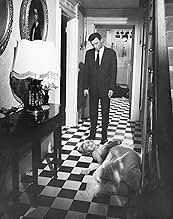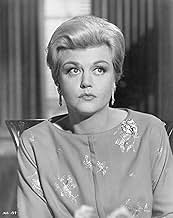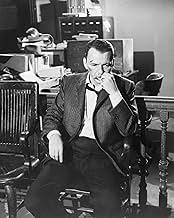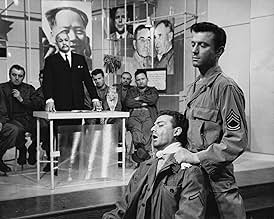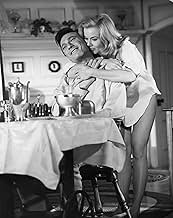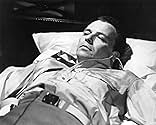Ein ehemaliger Kriegsgefangener wird als unwissentlicher Attentäter für eine internationale kommunistische Verschwörung einer Gehirnwäsche unterzogen.Ein ehemaliger Kriegsgefangener wird als unwissentlicher Attentäter für eine internationale kommunistische Verschwörung einer Gehirnwäsche unterzogen.Ein ehemaliger Kriegsgefangener wird als unwissentlicher Attentäter für eine internationale kommunistische Verschwörung einer Gehirnwäsche unterzogen.
- Regie
- Drehbuch
- Hauptbesetzung
- Für 2 Oscars nominiert
- 6 Gewinne & 9 Nominierungen insgesamt
Joe Adams
- Psychiatrist
- (Nicht genannt)
Alyce Allen
- Woman
- (Nicht genannt)
Benjie Bancroft
- Chauffeur
- (Nicht genannt)
Empfohlene Bewertungen
As a long time fan of this film I note there is little that has gone unmentioned in the positive reviews - except this. I would like to put in a word of praise for the academy award winning editor Ferris Webster. Webster's crowning achievement was the famed 'garden party' sequence in which the malevolent communist agents are transformed into ladies at a garden club and back again, the vertigo of the circling camera draws us into the actual mental state of the brainwashed captives. Each camera movement, each shot was so exquisitely timed and placed that this is almost equal to the shower-bath scene in Psycho as a classic of modern editing. This scene is still studied in film schools by future editors. Also, the cutting in the finale scene at the convention expertly creates a Hitchcockian suspense totally dependent on the editing.
Another aside, Angela Lansbury 'cut her teeth' for this role playing the ruthless newspaper owner in the Tracy-Hepburn film State of the Union. In that film she managed to upstage Hepburn herself! And it was obvious that she should play the 'biggest, baddest mother of all'.
Another aside, Angela Lansbury 'cut her teeth' for this role playing the ruthless newspaper owner in the Tracy-Hepburn film State of the Union. In that film she managed to upstage Hepburn herself! And it was obvious that she should play the 'biggest, baddest mother of all'.
While many cast members did an outstanding job in this disturbing and often violent political thriller, it is Angela Lansbury who stands out in her superb portrayal of a woman who not only dominates her son and husband but who wants to take over the entire country, if not the world! In the end, this is Angela's triumph, and I don't understand why she took second billing behind any of the other actors.
As much as I love Janet Leigh, she was handed a bizarre and somewhat minor role here which I believe only served as a deliberate distraction in that she never influenced Major Marco (Sinatra) as an agent working on either side. And don't get sidetracked by the fact that "Pinocchio" was playing at the Manhattan movie theater that she and Major Marco passed in the cab because that was probably a deliberate "red herring" too. Granted that Leigh and Tony Curtis, including their sensational divorce, were quite the rage at the time, but Angela deserved top billing here.
When I read that Lansbury has only appeared in 54 full length movies to date, it seemed like a number too small only because she leaves such a strong impression in so many of her performances dating back to Nancy, the maid, in "Gaslight" and Sybil in "The Picture of Dorian Grey". To this day, I am haunted by the memory of poor Sybil singing "Goodbye, Little Yellow Bird" in the latter. Lansbury masters a wide range of effective acting from the kindly, unassuming Miss Marple to the powerful, detestable Eleanor Shaw Iselin here.
In addition to a towering Lansbury, the excellent portrayals by Frank Sinatra, Laurence Harvey, Janet Leigh, John McIver, Henry Silva, and James Gregory as the annoying buffoon of a step-father contribute to the success of this political thriller. I think that director John Frankenheimer and screenplay writer George Axelrod should be commended for staying close to Richard Condon's original novel, and the stark black and white photography enhanced the gloomy and ominous atmosphere. The filming of the three separate interpretations of the brainwashing sequence alone was a unique and unforgettable cinematic experience.
What a dish like Jocelyn Jordan (Leslie Parrish) ever saw in Raymond Shaw is beyond me, and we have surely witnessed Harvey as the dark, brooding character before ("Room at the Top", "Butterfield Eight", etc.), but who else could play this morose character more accurately?
As to that newspaper headline "Violent Hurricane Sweeps Midwest", did you folks in the Midwest ever experience a direct hurricane? I know about the tornadoes and the floods, but a direct hurricane? Was that another subtle attempt at humor by the director? Anyway, I'll never look at another hydrangea without much trepidation and dread.
As much as I love Janet Leigh, she was handed a bizarre and somewhat minor role here which I believe only served as a deliberate distraction in that she never influenced Major Marco (Sinatra) as an agent working on either side. And don't get sidetracked by the fact that "Pinocchio" was playing at the Manhattan movie theater that she and Major Marco passed in the cab because that was probably a deliberate "red herring" too. Granted that Leigh and Tony Curtis, including their sensational divorce, were quite the rage at the time, but Angela deserved top billing here.
When I read that Lansbury has only appeared in 54 full length movies to date, it seemed like a number too small only because she leaves such a strong impression in so many of her performances dating back to Nancy, the maid, in "Gaslight" and Sybil in "The Picture of Dorian Grey". To this day, I am haunted by the memory of poor Sybil singing "Goodbye, Little Yellow Bird" in the latter. Lansbury masters a wide range of effective acting from the kindly, unassuming Miss Marple to the powerful, detestable Eleanor Shaw Iselin here.
In addition to a towering Lansbury, the excellent portrayals by Frank Sinatra, Laurence Harvey, Janet Leigh, John McIver, Henry Silva, and James Gregory as the annoying buffoon of a step-father contribute to the success of this political thriller. I think that director John Frankenheimer and screenplay writer George Axelrod should be commended for staying close to Richard Condon's original novel, and the stark black and white photography enhanced the gloomy and ominous atmosphere. The filming of the three separate interpretations of the brainwashing sequence alone was a unique and unforgettable cinematic experience.
What a dish like Jocelyn Jordan (Leslie Parrish) ever saw in Raymond Shaw is beyond me, and we have surely witnessed Harvey as the dark, brooding character before ("Room at the Top", "Butterfield Eight", etc.), but who else could play this morose character more accurately?
As to that newspaper headline "Violent Hurricane Sweeps Midwest", did you folks in the Midwest ever experience a direct hurricane? I know about the tornadoes and the floods, but a direct hurricane? Was that another subtle attempt at humor by the director? Anyway, I'll never look at another hydrangea without much trepidation and dread.
Probably John Frankenheimer's best production, and Frank Sinatra's best cinema performance.
I saw this because of the recent 'remake', I would assume that the reader will be making the same comparison. Having never seen this before, I found myself riveted to the story, and absolutely great performances by Sinatra, Laurence Harvey, Janet Leigh, Angela Lansbury, Henry Silva, John McGiver, James Gregory, and Leslie Parrish.
Coincidently, I had just recently finished reading some previously published works about the cold war, in particular the Chambers-Hiss court cases.
It might be accident, but I wouldn't doubt it might have been intended by Frankenheimer to choose Harvey, who resembled Hiss, in appearance and McGiver who resembled Chambers appearance. When this was released in 1962, the Hiss-Chambers spy fiasco was still fresh in the public's mind.
Other American political images are not for want of satire either, since Lansbury and Gregory seemed to have reminded me, in appearance, of Mary and (honest) Abe Lincoln.
The pace, style and non stop tension rivals Hitchcock; it will certainly have you wondering if he had anything to do with this! Truly Frankenhiemer, excels here.
Because Sinatra was box office magnet, most of his other roles seemed 'fitted' for him. Not here! You'll have a chance to see the real Frank Sinatra, really working to make the part work, and without a doubt, he too excels in his role.
I don't think I'll bother to see the recent version yet. I want to see this original classic a few more times.
I saw this because of the recent 'remake', I would assume that the reader will be making the same comparison. Having never seen this before, I found myself riveted to the story, and absolutely great performances by Sinatra, Laurence Harvey, Janet Leigh, Angela Lansbury, Henry Silva, John McGiver, James Gregory, and Leslie Parrish.
Coincidently, I had just recently finished reading some previously published works about the cold war, in particular the Chambers-Hiss court cases.
It might be accident, but I wouldn't doubt it might have been intended by Frankenheimer to choose Harvey, who resembled Hiss, in appearance and McGiver who resembled Chambers appearance. When this was released in 1962, the Hiss-Chambers spy fiasco was still fresh in the public's mind.
Other American political images are not for want of satire either, since Lansbury and Gregory seemed to have reminded me, in appearance, of Mary and (honest) Abe Lincoln.
The pace, style and non stop tension rivals Hitchcock; it will certainly have you wondering if he had anything to do with this! Truly Frankenhiemer, excels here.
Because Sinatra was box office magnet, most of his other roles seemed 'fitted' for him. Not here! You'll have a chance to see the real Frank Sinatra, really working to make the part work, and without a doubt, he too excels in his role.
I don't think I'll bother to see the recent version yet. I want to see this original classic a few more times.
I went into "The Manchurian Candidate" without knowing too much about the movie itself. I knew about its critical acclaim, but I was unfamiliar with the plot. Regardless, when I rented and watched the film, I had high expectations. I was not disappointed either.
The plot revolves around the strange case of Raymond Shaw, a sergeant who wins the Congressional Medal of Honor for his bravery in the cold war. Two of the men in his company, however, have strange nightmares that suggest Raymond is not as deserving of the award as he seems. One of these men, Major Bennet Marco, led on by these recurring nightmares, unravels a sinister Communist plot. Set against the cold war paranoia of the sixties and McCarthyism, "The Manchurian Candidate" does an excellent job of recreating the intense suspense and tension of the time.
The acting in this film is superb. A great script is heightened by excellent acting in this movie. It's hard not to like Frank Sinatra in his role as Marco, who is the protagonist. Laurence Harvey as Raymond does a good job showing us a character that is wholly unlikable and snobby, yet pathetic and sad at the same time. And of course, Angela Lansbury in her role as Raymond's malicious and plotting mother is excellent.
Some stand-out scenes in the film were the nightmare sequences that brilliantly interlaced dream and reality, the all-queen solitaire game with Marco and Raymond, and the supremely tense climax at the political convention. The cinematography in the movie was very well done as action, romance, and tension all mixed together smoothly. All the scenes managed to keep my attention and kept me wondering what was going to happen next. As a thriller, the film works remarkably well, and it is quite easily the best political thriller I've seen to date.
Keeping me from giving the movie a perfect ten are one or two little nagging problems. I wasn't a big fan of the music for the movie, and it even disrupted the mood for me at one point in the film. It was okay, just not great. Also, the whole plot is sort of unlikely. I wont go into it here, but I don't think that the Communist plan for world domination would fall into the hands of one relatively uncontrolled person, no matter how well trained his mind was. That's just my opinion, however.
The movie is sort of long, and isn't exactly action packed, but it is very interesting, insightful, and even chilling. I had a great time watching it, and I definitely recommend it if you are interested at all in seeing a gripping Cold War era political thriller. Besides, the cultural relevance of the film alone is enough to see it.
9/10
The plot revolves around the strange case of Raymond Shaw, a sergeant who wins the Congressional Medal of Honor for his bravery in the cold war. Two of the men in his company, however, have strange nightmares that suggest Raymond is not as deserving of the award as he seems. One of these men, Major Bennet Marco, led on by these recurring nightmares, unravels a sinister Communist plot. Set against the cold war paranoia of the sixties and McCarthyism, "The Manchurian Candidate" does an excellent job of recreating the intense suspense and tension of the time.
The acting in this film is superb. A great script is heightened by excellent acting in this movie. It's hard not to like Frank Sinatra in his role as Marco, who is the protagonist. Laurence Harvey as Raymond does a good job showing us a character that is wholly unlikable and snobby, yet pathetic and sad at the same time. And of course, Angela Lansbury in her role as Raymond's malicious and plotting mother is excellent.
Some stand-out scenes in the film were the nightmare sequences that brilliantly interlaced dream and reality, the all-queen solitaire game with Marco and Raymond, and the supremely tense climax at the political convention. The cinematography in the movie was very well done as action, romance, and tension all mixed together smoothly. All the scenes managed to keep my attention and kept me wondering what was going to happen next. As a thriller, the film works remarkably well, and it is quite easily the best political thriller I've seen to date.
Keeping me from giving the movie a perfect ten are one or two little nagging problems. I wasn't a big fan of the music for the movie, and it even disrupted the mood for me at one point in the film. It was okay, just not great. Also, the whole plot is sort of unlikely. I wont go into it here, but I don't think that the Communist plan for world domination would fall into the hands of one relatively uncontrolled person, no matter how well trained his mind was. That's just my opinion, however.
The movie is sort of long, and isn't exactly action packed, but it is very interesting, insightful, and even chilling. I had a great time watching it, and I definitely recommend it if you are interested at all in seeing a gripping Cold War era political thriller. Besides, the cultural relevance of the film alone is enough to see it.
9/10
Still one of the finest movies of its genre, this original film version of "The Manchurian Candidate" features excellent atmosphere, memorable characters, and a first-rate cast. John Frankenheimer's direction shows a very good understanding of the material and its potential, and indeed it is a rare example of a top quality movie being made from an average novel, rather than the other way around.
Frank Sinatra and Laurence Harvey carry the bulk of the movie, as former members of the same military unit in Korea, who slowly learn the truth about their shared past. Both give fine performances, with Sinatra's character perpetually nervous and fearful of what he will find, yet compelled to get at the truth, while Harvey as Sergeant Shaw is coldly self-composed, and contemptuous of anyone else's weakness.
The supporting cast is also excellent. Angela Lansbury's icy presence as Shaw's mother is unforgettable, Janet Leigh makes an intriguing woman of mystery, and James Gregory is flawless as a pestilential, brainless Senator. Khigh Dhiegh also has some fine moments of refined cruelty as evil mastermind Yen Lo.
Some of the finest scenes come from the dream sequences, which are crafted very well from a technical viewpoint, and which also ring true with the story as it comes out. They produce some chilling moments, as well as making the plot concept - which in itself is pretty far- fetched - seem more believable.
With the passage of time and the dissolution of Cold War tensions, it's now possible to watch this without any political baggage, and to allow the excellent production to stand on its own high quality, rather than on any contemporary sentiments.
Frank Sinatra and Laurence Harvey carry the bulk of the movie, as former members of the same military unit in Korea, who slowly learn the truth about their shared past. Both give fine performances, with Sinatra's character perpetually nervous and fearful of what he will find, yet compelled to get at the truth, while Harvey as Sergeant Shaw is coldly self-composed, and contemptuous of anyone else's weakness.
The supporting cast is also excellent. Angela Lansbury's icy presence as Shaw's mother is unforgettable, Janet Leigh makes an intriguing woman of mystery, and James Gregory is flawless as a pestilential, brainless Senator. Khigh Dhiegh also has some fine moments of refined cruelty as evil mastermind Yen Lo.
Some of the finest scenes come from the dream sequences, which are crafted very well from a technical viewpoint, and which also ring true with the story as it comes out. They produce some chilling moments, as well as making the plot concept - which in itself is pretty far- fetched - seem more believable.
With the passage of time and the dissolution of Cold War tensions, it's now possible to watch this without any political baggage, and to allow the excellent production to stand on its own high quality, rather than on any contemporary sentiments.
Wusstest du schon
- WissenswertesFrank Sinatra broke the little finger of his right hand on the desk in the fight sequence with Henry Silva. Due to on-going filming commitments, he could not rest or bandage his hand properly, causing the injury to heal incorrectly. It caused him chronic discomfort for the rest of his life.
- PatzerIn the opening sequence, set in 1952, the bar in Korea has a US flag with 50 stars. In 1952, the US included only 48 states, and the flag had only 48 stars. There are also some 50-star flags alongside period correct 48-star flags during the convention scenes.
- Zitate
Bennett Marco: Raymond Shaw is the kindest, bravest, warmest, most wonderful human being I've ever known in my life.
- Crazy CreditsThe closing credits specify, "Released thru United Artists". This uses an informal spelling of the standard "through".
- Alternative VersionenThe West German version was edited (ca. 4 minutes) to remove every scene with the ladies in the greenhouse. This version was also released on DVD. In 2005 the uncut version (with subtitles for the missing scenes) was shown on Arte. Only in 2020 was the complete version released on Blu-ray/DVD.
- VerbindungenEdited into Commercial Entertainment Product (1992)
- SoundtracksThe Washington Post
(1889) (uncredited)
Music by John Philip Sousa
Played by a band in the first scene after the opening credits
Top-Auswahl
Melde dich zum Bewerten an und greife auf die Watchlist für personalisierte Empfehlungen zu.
Details
- Erscheinungsdatum
- Herkunftsland
- Sprachen
- Auch bekannt als
- El embajador del miedo
- Drehorte
- Jilly's, 52nd Street at 8th Avenue, Manhattan, New York City, New York, USA(bar where Shaw hears he ought to go jump in a lake)
- Produktionsfirma
- Weitere beteiligte Unternehmen bei IMDbPro anzeigen
Box Office
- Budget
- 2.200.000 $ (geschätzt)
- Bruttoertrag in den USA und Kanada
- 2.757.256 $
- Eröffnungswochenende in den USA und in Kanada
- 87.850 $
- 15. Feb. 1988
- Weltweiter Bruttoertrag
- 2.757.256 $
- Laufzeit2 Stunden 6 Minuten
- Farbe
- Sound-Mix
- Seitenverhältnis
- 1.85 : 1
Zu dieser Seite beitragen
Bearbeitung vorschlagen oder fehlenden Inhalt hinzufügen



